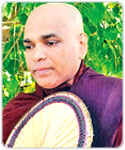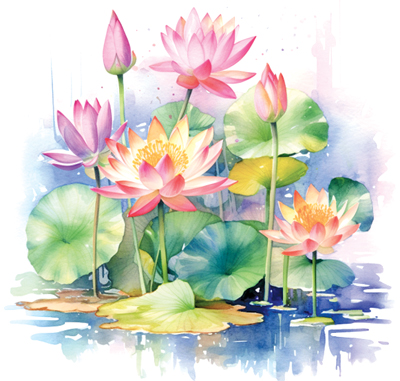Is fear for Samsara diminishing from the followers of Buddhism ?
 Dr. Most Venerable Dr. Most Venerable
Mirisse Dhammika Nayaka Thera
Existence of Bhava can be significantly divided into two sections namely Karma
process and karma produced rebirth. The bundle of aggregates is the substructure
of both these categories. Bhava is formed by the activation of the five groups
of clinging the corporeality, the feeling, the perception, mental formation and
consciousness. In a nutshell, it is the formation and the termination of the
bundle of aggregates which is also called the birth and death. Formation of the
bundle of aggregates, in other words, formation of Bhava related births are
created as a result of gathering of mental formations in other words, assembling
unwholesome and wholesome actions (karma) because of ignorance and delusion.
 What is the true nature of the Bhava related birth? It can be understood
according to a sermon of the Thathagatha Buddha. In the sermon, it is stated
that, Bhikhu, there is no end to the round of birth. The inception of it cannot
be seen or comprehended. Being whirl and proceed in the round of birth
enwrapping themselves in delusion and clinging. Beings have undergone
excruciating pain and have been exposed to immeasurable number of lamentable
tragedies throughout while existing in the Samsara. The entire Earth is
nourished with the dead bodies of yours, making the Earth, a graveyard. All the
beings endured extreme agony for an unfathomably long period of time in the
Samsara. It is important that the followers of the Buddha, whether they are
clergymen or laymen, with proper understanding, bear this teaching of the
Thathagatha Buddha and take it into account. It is also significant to become
conscious of extremely dangerous state of the samsara as preached by the Buddha
through his wisdom. Thathagatha Buddha, during the enlightenment along with
perceiving the four noble truths, was also endowed with three fold higher
knowledge namely the wisdom to remember the former rebirths, the wisdom of the
divine eye and the wisdom to extinct all the canters. Here, the could see his
own births and deaths, himself. Then, what did the Buddha realize? The Buddha
noticed that in the long journey of Samsara, all the beings including himself
had been born in all the 31-planes of existence, yet stressed that mostly were
born in the four lower worlds namely, in the hell, in the animal kingdom, in the
ghost realm and in the demon world. There are 31-sections in the hell. The
animal kingdom is immeasurable. The ghost-realm consists of 4-major parts.
Acceptance of merits, which is bestowed by the humans, can only be done by the
Paradaththupajeevi of the ghost-realm. It is stated that the life time which has
to be spent with suffering in various hells, is different from one another. What is the true nature of the Bhava related birth? It can be understood
according to a sermon of the Thathagatha Buddha. In the sermon, it is stated
that, Bhikhu, there is no end to the round of birth. The inception of it cannot
be seen or comprehended. Being whirl and proceed in the round of birth
enwrapping themselves in delusion and clinging. Beings have undergone
excruciating pain and have been exposed to immeasurable number of lamentable
tragedies throughout while existing in the Samsara. The entire Earth is
nourished with the dead bodies of yours, making the Earth, a graveyard. All the
beings endured extreme agony for an unfathomably long period of time in the
Samsara. It is important that the followers of the Buddha, whether they are
clergymen or laymen, with proper understanding, bear this teaching of the
Thathagatha Buddha and take it into account. It is also significant to become
conscious of extremely dangerous state of the samsara as preached by the Buddha
through his wisdom. Thathagatha Buddha, during the enlightenment along with
perceiving the four noble truths, was also endowed with three fold higher
knowledge namely the wisdom to remember the former rebirths, the wisdom of the
divine eye and the wisdom to extinct all the canters. Here, the could see his
own births and deaths, himself. Then, what did the Buddha realize? The Buddha
noticed that in the long journey of Samsara, all the beings including himself
had been born in all the 31-planes of existence, yet stressed that mostly were
born in the four lower worlds namely, in the hell, in the animal kingdom, in the
ghost realm and in the demon world. There are 31-sections in the hell. The
animal kingdom is immeasurable. The ghost-realm consists of 4-major parts.
Acceptance of merits, which is bestowed by the humans, can only be done by the
Paradaththupajeevi of the ghost-realm. It is stated that the life time which has
to be spent with suffering in various hells, is different from one another.
Are there any issues when considering the Dhamma, otherwise known as the
teaching of the Buddha whom you and I follow with understanding? As a result of
not practicing Dhamma repeatedly with a stable mind, having a deep fondness
towards it, the mind would get attached to mundane purposes creating craving,
infatuation, pride and speculative opinions. However, people do not consider
that these purposes are short-lived and also that they can change their nature
at any moment; further, that people can only live upto 100 years maximally.
People do understand how dangerous the samsara is, by engaging the cognitive
power in their brains. Yet, because of the lack of continuous usage of Dhamma,
that knowledge gets diminished when the mind gets involved and gets attached to
mundane purposes. Emergency of covetousness and displeasure would conceal the
knowledge on Dhamma, resulting ‘Personality Belief’ to be created, making a
person to think it’s ‘me’ and ‘mine’. In this instance, amiable purposes would
produce an intensified degree of craving while incompatible purposes would
initiate conflicts and anger. The result of these can be mentioned below, in
brief. There will be an exposure to do the 5-misdeeds and 10-immoral deeds. In a
simplified version, people will be very much vulnerable to defilements such as
deep clinging, unsatisfied desire, craving, anger, deep resentment, jealousy,
vengeance, enmity, pride, ungratefulness and ingratitude.
People’s untrained mind would not perceive that the bundle of aggregates
maintained as the body with life is always subjected to continuous decay and
this decomposition, catalysed by various diseases, may bring death at any
moment. At any instance, even if they understand the truth, people’s mind would
be subsided or lethargic when they encounter deep attachment or anger which
hinder them from realizing the true nature of life. Let’s interrogate about this
matter further. ‘Who does not know that, one has to leave everything. Which were
called ‘me’ and ‘mine’ and depart from this world one day? Who can say what kin
of diseases would conquer us, for us to suffer? Who wouldn’t know that we do not
actually own even a minute hair of our body, which we nourish by eating,
drinking and clean by washing and bathing.
However, isn’t it easy to understand the mentality and the state of
consciousness of plenty of followers of the Buddha, by analyzing their speech
and behavior? At every moment, a continuum of consciousness, in other words, a
process of cognitive series is created based on greediness, hatred and delusion
leading to generate continuous cankers. In the process of cognitive series,
every conscious-moment that is created in a corrupted mind, in other words, in a
‘PaduttaChittha’ brings forth defilements. All these get rooted in the
subconscious mind. On the other hand, there is a possibility of wholesome
courses of action based on greedlessness, hatelessness and non-delusion. Yet,
unwholesome courses of actions are quite significantly initiated in an untrained
mind of a person. A fine example for this is how people who say ‘we have done
ample meritorious deeds’ behave, when they are down with diseases, at a loss of
a loved one, at despair and on the verge of death.
After inhaling and exhaling and at the next moment if inhaling isn’t possible,
that denotes death. If that occurrence is perceived with wisdom, one should
understand the nature of what is thought, done or spoken. Getting bonded with
love or making conflicts with anger based on misconceptions would pave one’s way
to be born in one of the 4-lower worlds which bring ceaseless suffering.
Shouldn’t it wise to flourish the spirituality in life by engaging in Seela, to
put it in another way, to lead the mundane life with disciplinary awareness and
proper conduct in order to curtail, falling into the lower worlds? All our
relationships related to the entire animate bodies and inanimate things are
restricted only to this world. They are impermanent: temporary. Should we create
suffering and anonizingSamsara because of these? We should contemplate on
acquiring much more greater value for our human life, which we have quite rarely
got after suffering immensely in the long, endless, painful Samsara. |
